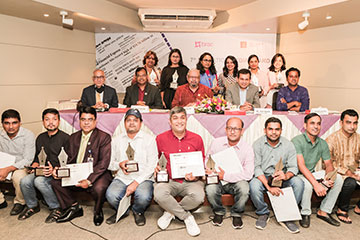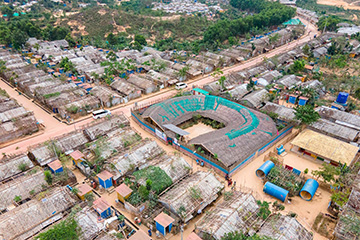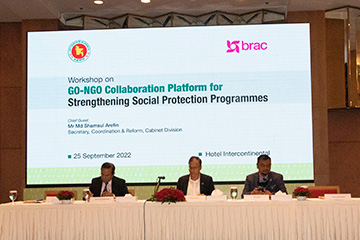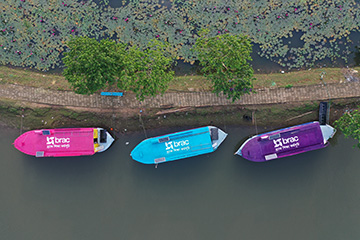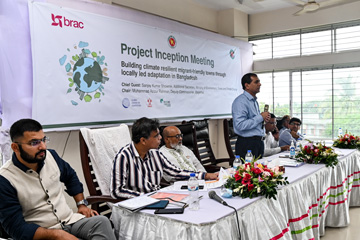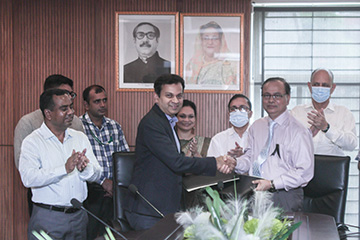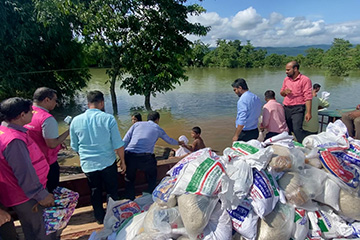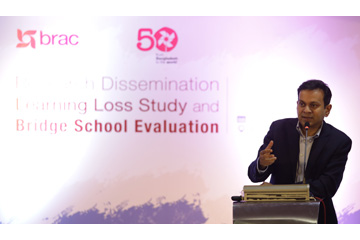
English (965)
Children categories
16 journalists received the BRAC Migration Media Award

16 journalists have received the BRAC Migration Media Award for their contribution to journalism in the field of migration. On Thursday (29 September 2022) the Minister of expatriates' welfare and overseas employment, Mr. Imran Ahmad, MP, attended a ceremony organised at BRAC Center as the chief guest and handed over the prizes to the winners. Director General of Bureau of manpower employment and training Md. Shahidul Alam, BRAC Executive Director Mr. Asif Saleh, and BRAC Migration Programme and Youth Initiative Programme Head Shariful Islam Hasan were present at the time.
BRAC introduced the award in 2015 to recognize journalism in the migration sector. This year the award was given for the seventh time. The award was given under the inspiration project of the BRAC Migration Programme in collaboration with the Embassy of Denmark in Bangladesh.
The chief guest of the event, Expatriates' Welfare and Overseas Employment Minister Imran Ahmed, MP highlighted various measures of the government for the welfare of expatriates and said that everyone should work together. Addressing the journalists, he said that the role of the media is important in protecting the rights of migrants and providing correct information. He suggested to present the news avoiding bias.

Director General of Bureau of manpower employment and training, Md. Shahidul Alam, NDC, who was the special guest of the event, said that 7.8 million people have gone abroad in the last 13 years. 212 billion dollars (21 thousand 200 million dollars) came from expatriate income. These positive things can also come in the media. In addition to journalists, he proposed to give fair migration award to those agencies who ethically employ foreign workers.
BRAC executive director Asif Saleh, president of the event, said that migration is very important in poverty alleviation, especially in the rural economy. That is why we work in the migration sector to create skilled people, secure migration, stop human trafficking and repatriate repatriates. Every year we organise this event of Media Awards with enthusiasm so that a picture of the whole year emerges. He said, if there is goodwill, change is possible.
Shariful Hasan, Head of BRAC's Migration and Youth Initiatives Programme, presented the keynote address. International Organization for Migration (IOM) Deputy Chief of Mission Nusrat Ghazzali, ILO Chief Technical Advisor Laetitia Weibel, Jury Board Member from the Ministry of expatriates' welfare and overseas employment, deputy secretary Mr. ABM Abdul Halim and Secretary General of Bangladesh Association of International Recruiting Agencies, Mr. Shamim Ahmed Chowdhury Noman spoke on the occasion.
On January 14 this year, the announcement of the 7th BRAC Migration Media Award was published on the media and BRAC website. This year, the members of the jury board were Professor Robaet Ferdous of the Department of Mass Communication and Journalism of Dhaka University, Mr. ABM Abdul Halim, Deputy Secretary of the expatriates' welfare and overseas employment Ministry, Shaikh Muhammad Refat Ali of ILO and Chief News Editor of News24 Television Shahnaz Munni.
Daily Samakal's Rajib Ahmed won the first place in the newspaper national category this year. Prothom Alo's Mansoora Hossain was second and The Financial Express's Arafat Ara and Ajker Patrika’s correspondent Md. Shahriar Hasan (currently working in Dainik Bangla) achieved joint third place. Farooq Munir of daily Chittagong Khabar was first in newspaper regional category, Shariful Islam of Ekushey newspaper was second and Md Emdad Uliah of weekly Chauddagram newspaper was third.
Sabina Yasmin of DBC News, (now working at Independent Television) took first place in the television news category. Marzia Mumu of Zaham Television was second and Masuda Khatun of News24 was third. Channel 24's Morshed Hassib Hasan won the award in the television program category. Md. Mostafizur Rahman of Bangladesh Betar won the award in the radio category.
The first prize in the online newspaper category was won by Md. Jahangir Alam of Jagonews 24 online. Dainik Prothom Alo's Md. Mohiuddin came second and Dainik Bangla's Jasmine Akhtar and expatriate freelancer Rakib Hasan jointly got the third prize.
Each winner receives a crest, certificate of recognition and a check for the prize money as an award.
The 2022 Aga Khan Award for Architecture honours Community spaces in the Rohingya refugee response

A BRAC and ActionAid in Bangladesh initiative
One of the six winners of the 2022 Aga Khan Award for Architecture is Community Spaces in the Rohingya Refugee Response, a programme created through a partnership between BRAC and ActionAid to design dignified space for the Rohingya refugees based on their culture, craftsmanship and identity. Located in Cox’s Bazar, Bangladesh, in the world’s largest refugee camps, the spaces are a collective of six sustainably built structures that evolved collaboratively in the field without drawings or models. The process was led by architects Khwaja Fatmi, Rizvi Hassan and Saad Ben Mostafa, working in close cooperation with women and girls of the Rohingya community. It reflects BRAC’s commitment to unlocking the potential of people and communities, frontline pragmatism, frugal innovation, and engaging women as catalysts of change.
The six spaces are part of a massive response to the forced displacement of almost one million Rohingyas from Myanmar to Bangladesh in August 2017. That displacement left the community feeling like a ship without an anchor. The loss of homes and possessions, the temporary living arrangements in makeshift shelters and the denial of nationality imprinted a sense of dissociation and a loss of any feeling of safety. As time went on, and dependence on aid increased, the sense of loss grew, and the effects were disproportionately felt by women and girls.
Amid the congested shelters, community spaces were needed where women and girls could access support networks, strengthen social relationships, learn and share skills, and find peace. Vital was the participation of women and girls in the design who would use the resulting spaces.
The spaces that evolved are female-friendly, low to the ground to withstand cyclones, and recognizable for their complex roof trusses built by Rohingya bamboo workers. The exteriors are designed to avoid disturbing visiting elephants.
The Award’s master jury citation calls the spaces an “ingenious response to emergency needs related to the major influx of Rohingya refugees into Bangladeshi host communities, with particular attention to the safety of women and girls.” It adds: “The concept and design of the six spaces are the result of appropriate planning, solid partnerships and inclusive processes involving the diverse refugee and host communities, such as defining spatial and functional needs. The project’s implementation succeeded in adapting to various constraints (physical, social, regulatory, budgetary, climatic and environmental) and harsh working conditions, and harnessing the skills of workers and artists – women and men from refugee and host communities – for both construction and decoration, drawing from a variety of Rohingya and Bangladeshi construction techniques, spatial and architectural features, ways of life and aesthetic references.”
The design process began with a focus group discussion led by the architects involving mostly Rohingya women. The discussion identified needs to be met by the structures – and how they could best be addressed. Construction used locally available materials such as bamboo, straw, and tarpaulin. The building of the spaces was led mostly by Rohingya men, many of whom are expertly skilled at woodwork and building with bamboo. The interior decoration was led mostly by Rohingya girls and women, who covered the structure with vibrant artwork and colours that continue to be expanded by other girls and women using the space.
The Aga Khan Award for Architecture is given every three years to projects that set new standards of excellence in architecture, planning practices, historic preservation and landscape architecture. The Award seeks to identify and encourage building concepts that successfully address the needs and aspirations of societies across the world, in which Muslims have a significant presence.
Workshop reintroduces GO-NGO Collaboration Platform

Right targeting must to shun resource misuse
Social safety net programmes design should have components to assist people to learn skills for income generation to become self-dependent, which will help them reduce their dependence gradually on safety net assistance. Also targeting the right people for receiving safety net assistance is a must for proper utilisation of the public funding. The social security system in Bangladesh, however, deals with errors of exclusion (failure to reach the needy) and errors of inclusion (providing aid to the non-needy), which leads to misplacement of resources.
These observations were drawn at the “Workshop on GO-NGO collaboration platform for strengthening social protection programmes” today on Sunday (25 September) at Hotel Intercontinental in Dhaka. Jointly organised by BRAC and the Cabinet Division of Bangladesh, the event had Shamsul Arefin, secretary (coordination and reform), Cabinet Division, as chief guest.
KAM Morshed, senior director, BRAC, Mohammad Khaled Hasan, joint secretary, Cabinet Division, Tapan Kumar Biswas, director, NGO Affairs Bureau, other government officials from different ministries, and representatives of 17 member NGOs of the GO-NGO Collaboration Platform were also present at the workshop.
In his opening remarks, BRAC senior director KAM Morshed said, “Despite its beginning with full vigour in 2018-19, the GO-NGO Collaboration Platform lost its momentum due to Covid induced lockdown. Through today’s workshop, we are trying to reintroduce the activities of the forum.”
“The government spends 2.55 percent of the GDP on social safety net programmes. However, in rapidly progressing countries like Bangladesh, a segment of the population in remote places usually fall behind. NGOs work for them, with them. This aligns with the SDG commitment of ‘leaving no-one behind’ and poverty alleviation,” he further said.
Cabinet secretary for coordination and reform Shamsul Arefin in his chief guest’s remarks said, “Article 15, Clause D of Bangladesh Constitution deals with the vision of creating a country free of poverty, hunger and exploitation. In 2015 the government formulated the National Social Security Strategy for the poor and marginalised.”
He further said, “We cannot achieve the goal without building consensus with NGOs, who have been the most essential partners of the government. They are complimenting the government in its struggle to eradicate poverty. The cabinet division has taken initiatives to institutionalise GO-NGO Collaboration Platform and deeply appreciates the support from BRAC.”
Joint secretary Mohammad Khaled Hasan discussed the scopes of collaboration between the government and development organisations. “A combination of social safety net and social security ladder provides both capital and training, thus the recipients utilise their resources to never fall back to the cycle of poverty,” Khaled said.
Participants in the workshop engaged in a dialogue to identify areas where NGOs can play the role of associate or subsidiary to the government. NGOs can play a key role in monitoring and evaluation and by taking the information and data gathered from the grassroots to policymakers, they observed. A key discussion also took place on “better targeting” to avoid misplacement of assistance.
To facilitate the mechanism of the social safety net in Bangladesh, the GO-NGO Collaboration Platform was introduced, with BRAC as the lead NGO. Thirteen representatives from ministries and agencies implementing social security programmes and 17 NGOs working on social security issues are part of the platform.
BRAC launches floating boats for play-based education

To celebrate the golden jubilee of BRAC – one of the world’s largest non-governmental organisations, BRAC today on Saturday, 17 September launched an exciting initiative in Sunamganj district to bring play-based and experiential learning for children through floating boats. The ceremony took place at the Upazila Parishad Auditorium in Bishwambharpur Upazila with great festivities and celebrations.
The event was attended by, among others MD Jahangir Alam, District Education Officer, Sunamganj; Mahamudul Hasan, Assistant Upazila Education Officer, Bishwambharpur; Badal Chandra Barman, District Children Affairs Officer, Sunamganj; MD. Safar Uddin, Upazila Chairman, Bishwambharpur. Safi Rahman Khan, Director, Education, Skills Development, and Migration; and Profulla Chandra Barman, Programme Head, Education Programme; were present from BRAC.

Thematically designed around mathematics, science, and values – the three boats will travel a long water route stretching from Sunamganj in the northeast to Bhola Island in the south bordering the Bay of Bengal. They will make stopovers en route where a wide range of children, students, teachers and people from the community can visit and experience the travelling exhibits along with activities. The duration of stopovers will be for 7-10 days from 10am-4pm. The boats will draw volunteer teachers from the local communities to guide visitors. Special ramps have been designed for children with disabilities.
Md Safar Uddin, Upazila Chairman of Bishwambharpur said, “BRAC boat school initiative of 2011 gave access to education to the deprived children of the haor areas. Education should be brought to the doorsteps of children and hence BRAC should reintroduce more boat schools to provide education to the disadvantaged children of haor areas.”
Safi Rahman Khan, Director, Education, Skills Development, and Migration said, “The inherent beauty and magic of math can at times be hard to see, and even harder to explain to students. Through experiential learning, play based and hands-on activities, children will hopefully enjoy and not fear math.”
The educational activities and materials have been particularly designed for primary school children, although older students and visitors will also be able to experience the joy of learning. The visitors will be offered activities and contents on values, while subjects on maths and science are designed with puzzles, hands-on experiments, problem solving with fun activities and games, and photographic introduction to great scientists and mathematicians.
The Values Boat was inspired by the philosophy of Sir Fazle Hasan Abed, founder of BRAC, who ensured that along with regular academic subjects, value education and performing fine arts are incorporated in BRAC schools.
All the boats will be covered under CCTV surveillance and will strictly follow BRAC’s safeguarding policies along with the health, safety and security guidelines.
BRAC had introduced the boat schools in the wetlands (haor regions) of north-eastern Bangladesh in 2011. The idea was to bring the classroom to the children who were deprived from accessing education living in the haors. The Boat School project was selected as “100 Global Inspiring Innovations of 2017” list by HundrED, a Finnish global education non-profit organisation.
As the largest development collaborator of the government, BRAC has been undertaking and scaling up innovative learning initiatives for this along with other difficult-to-access regions.
BRAC, Mongla Port Municipality launch town development project
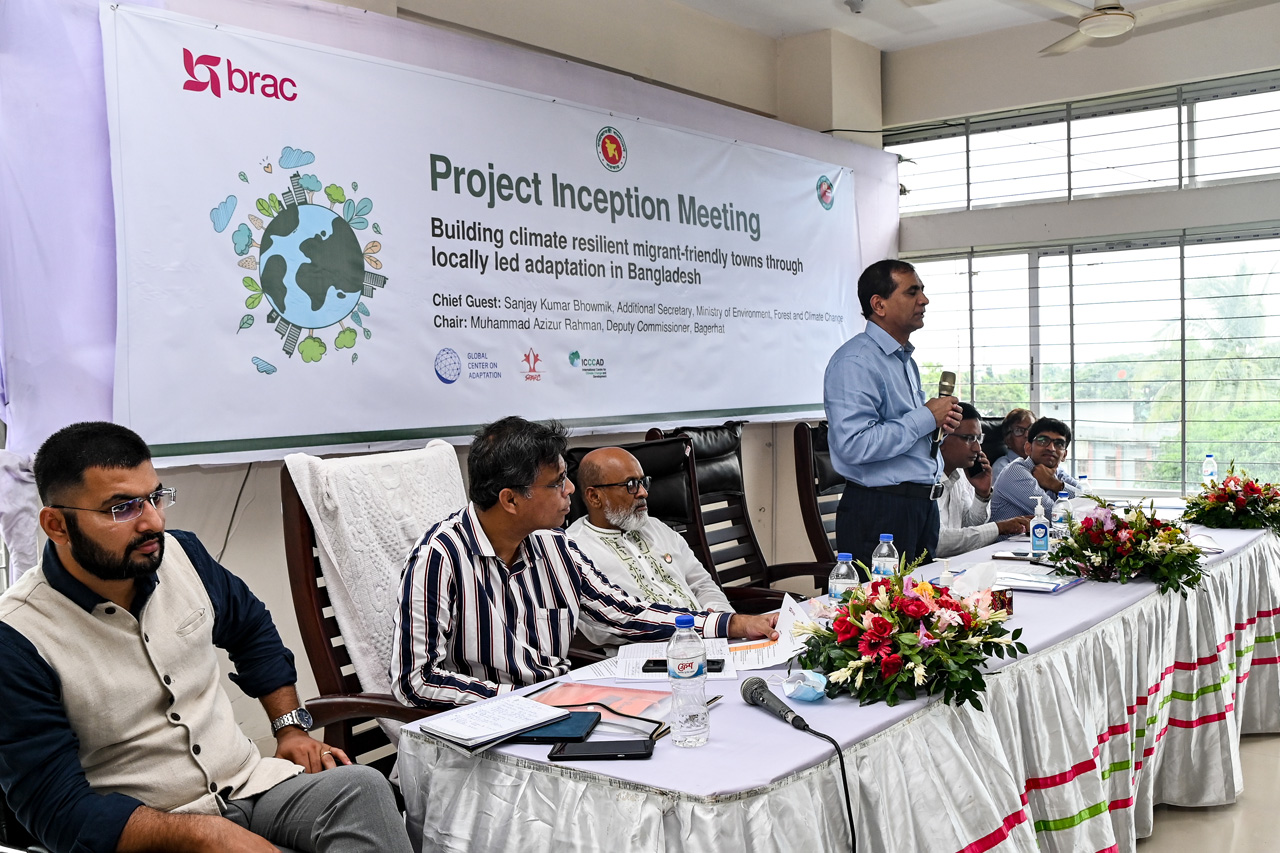
Climate-resilient migrant-friendly town development urgent
Through locally-led adaptations
Bangladesh is globally recognised as a role model in tackling climate change impacts with sustainable solutions. The district of Bagerhat, especially its Mongla upazila, gets special importance in the climate adaptation initiatives of the government. It’s particularly so because the preservation and development of Sundarbans, a world heritage site situated in this region, means the development of the whole world.
This observation came from Sanjay Kumar Bhowmik, additional secretary, Ministry of Environment, Forest and Climate Change, while he spoke as chief guest at the inception meeting of a project titled ‘Building climate resilient migrant-friendly towns through locally-led adaptation in Bangladesh’.
Development organisation BRAC and Mongla Port Municipality jointly organised the programme today on Monday (05 September 2022) at the Upazila Muktijoddha Complex in Mongla Port Municipality town.
The project will be implemented in a consortium of BRAC, International Centre for Climate Change and Development (ICCCAD) and technology service company Spark India. BRAC will be in charge of its overall implementation, while ICCCAD and Spark India will be technical and knowledge partners. Mongla Port Municipality will lead the implementation of the pilot in its township. The project has been undertaken with a view to strengthen the process of building climate-resilient migrant-friendly urban centres in Bangladesh. The programme will be replicated in three more urban centres by 2026 and in 26 more such areas by 2030.
Kamalesh Majumder, upazila nirbahi officer, said in his special guest’s speech, it is important to implement various projects by prioritising the needs of climate-vulnerable people. The main problem of Mongla city is the lack of safe drinking water. Increased salinity increased various health risks. It’s urgent to identify and solve the main problems in a sustainable manner.
Bir Muktijodha Sheikh Abdur Rahman, mayor, Mongla Port Municipal, and a special guest at the event, said that the coastal region especially Mongla Port Municipality is one of the most climate-vulnerable areas of Bangladesh. Ensuring safe water supply in this area is essential to combat climate risks. Also, sustainable measures should be undertaken to provide necessary facilities for climate migrants.
Dr. Md Liakath Ali, director, Climate Change Programme, BRAC & BRAC International, and Urban Development Programme, BRAC, in his chair’s speech said, this project is being implemented for the first time in Asia, funded by the Global Center on Adaptation (GCA). Climate change Programme and urban development Programme are closely related. The project will be worthwhile if the real needs of the climate migrants living in Mongla are identified and mitigated through appropriate measures.
At the meeting, BRAC Urban Development Programme’s programme head Imamul Azam Shahi presented details about the project, while Climate Change Programme’s programme head Abu Sadat Moniruzzaman Khan gave welcome speech. SPARK India official Nihar Johori presented a brief on mobilisation model for the development of low-income communities at risk of climate change. Savio Rozario from ICCCAD spoke on vulnerability, risk assessment and climate adaptation planning processes.
Md Hafiz-al-Asad, additional deputy commissioner (revenue), Bagerhat, educationists, journalists and dignitaries were also present on the occasion.
The project will provide support to climate migrants especially women, children, youth and citizens with disabilities to enhance skills, job opportunities, income generation, financial inclusion and social security opportunities.
BRAC and Sheikh Hasina National Institute of Burn and Plastic Surgery Sign MoU
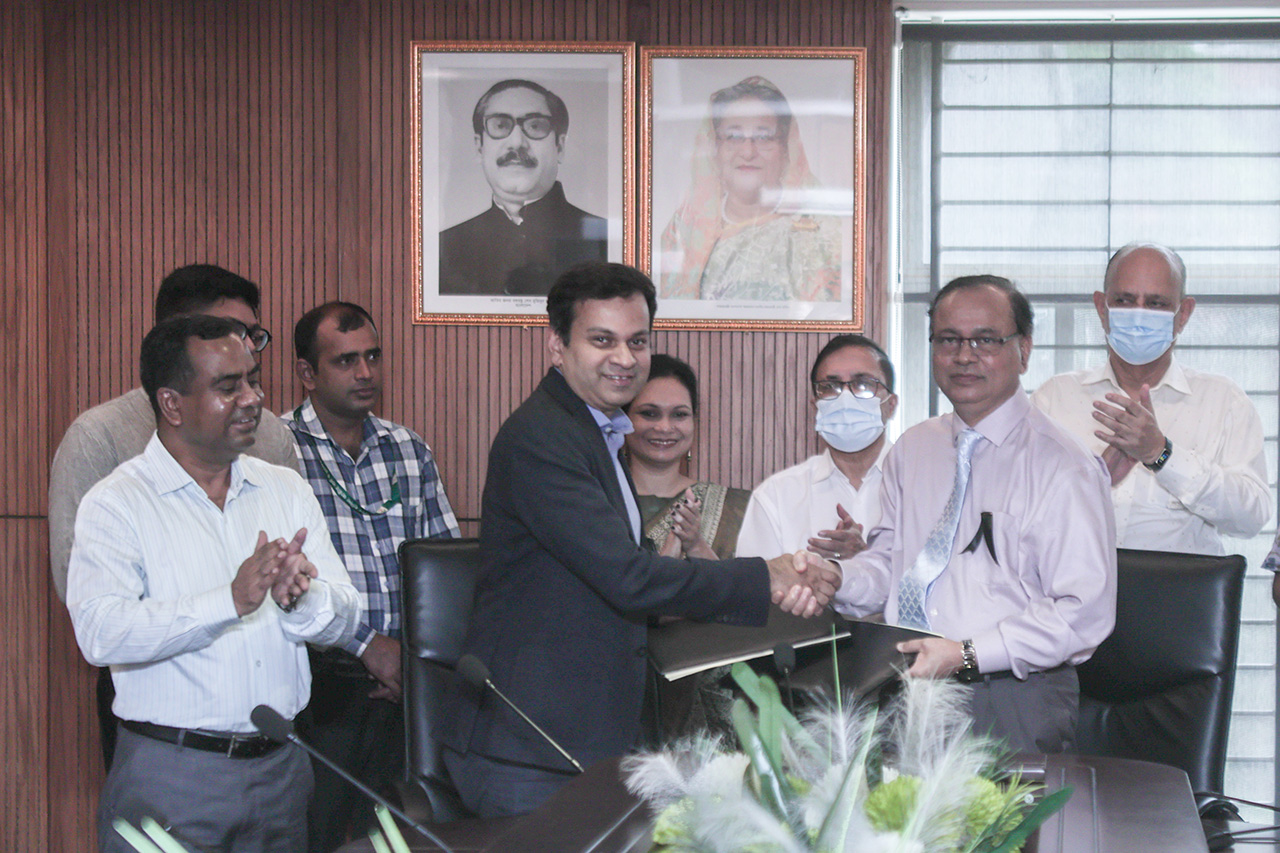
Accident survivors with disabilities will receive faster and subsidised treatment
We want to establish BRAC model in 8 medical colleges: Health directorate DG
Development organisation BRAC and the Sheikh Hasina National Institute of Burn and Plastic Surgery (SHNIBPS) signed a Memorandum of Understanding (MoU) today on Saturday (27 August) at the SHNIBPS conference room in the capital. The public-private partnership agreement will enable the two organisations to give faster and affordable treatment to the patients who have lost limbs in accidents.
Organisers said under this MoU, low-income patients will be able to get international quality treatment at an affordable cost (expenses will be up to 50% subsidised). In December 2021, BRAC and SHNIBPS jointly opened a new unit of Limb and Brace Center on the premises of SHNIBPS to run on a pilot basis, under the planning and operation of BRAC Limb and Brace Center (BLBC). So far, the unit gave subsidised rehabilitation care to over 450 patients. Under this MoU its services will see sustainable enhancement from now on.
Established in 1972, BRAC, now the world’s one of the largest development organisations, has been working for people’s socio-economic development including health and nutrition. Road traffic accidents (RTA), diabetic gangrene, burn, burger’s disease, cancer and congenital anomalies were reported to be some of the major causes of disability in Bangladesh. The BRAC Limb and Brace Center (BLBC) was established with a vision to support persons with disabilities, particularly from low-income communities. It provides patients with low cost, quality and user-friendly customised Prosthetics and Orthotics (P&O) services along with physiotherapy, counselling and rehabilitation services.
The event was attended by Professor ABM Khurshid Alam, director general, Directorate General of Health Services, Asif Saleh, executive director, BRAC, Professor Dr Md Abul Kalam, director, SHNIBPS, Dr Samanta Lal Sen, national coordinator, SHNIBPS, and Dr Morseda Chowdhury, director, BRAC Health Nutrition and Population Programme.
BRAC ED Asif Saleh and SHNIBPS director Professor Dr Md Abul Kalam signed the MoU on behalf of their respective organisations.
DGHS director-general Professor ABM Khurshid Alam said at the signing ceremony, “I thank BRAC for this great initiative. A large number of patients will benefit from this Limb and Brace Center. We have to make sure smooth operation of this Center. I want to replicate BRAC model to eight more medical colleges in the country. I would ask BRAC to come up with plans on which we will collaborate. You stood by the people during COVID-19, you are there now too. I do thank you, BRAC.”
BRAC ED Asif Saleh said, “Our founder Sir Fazle Hasan Abed was a social entrepreneur. Until his death he emphasised that BRAC will have to continue innovating solutions for new social issues, or else it would become irrelevant to the society. Following his guidance, BRAC continues its work to innovate models for pressing social problems. Through the model that we are launching today we are trying to give a much-needed service to people using the government infrastructure, where we have been successful in making it easily accessible and affordable. We had started the piloting with a positive mind upon receiving a proposal from the government to work in this area. Now we want to replicate this model. I am very hopeful about this sector because both you and we are eager to work collaboratively.”
He further added, “We have to think more on transforming it to a holistic system and bringing private sector organisations in this effort. We need strong collaboration for future success. Alongside, we would have to work to prevent road and all other forms of accidents. I am hopeful that in future this model will act as an exemplary partnership model for others to follow.”
BRAC HNPP director Dr Morseda Chowdhury said, “We are part of this PPP because we are earnest in our effort to serve the poor. Beforehand, an injured patient will have to visit different places for different kinds of healthcare. Now we are trying to bring all kinds of treatment and healthcare services under the same umbrella for them.”
SHNIBPS national coordinator Dr Samanta Lal Sen said, “I consider myself fortunate to have this Limb and Brace Center of BRAC operating here. We will now be able to give treatment services to many more patients. We will also be able to bring more such patients using BRAC’s network to give them treatment.”
SHNIBPS director Professor Dr Md Abul Kalam said, “Every year many people become disabled from electrocution. We give prosthetics services to 300-350 patients every year. BRAC’s proposal was important for us. We have been able to give services to over 450 people in just last eight months. We therefore heartily thank BRAC.”
National consultation on welfare of RMG workers
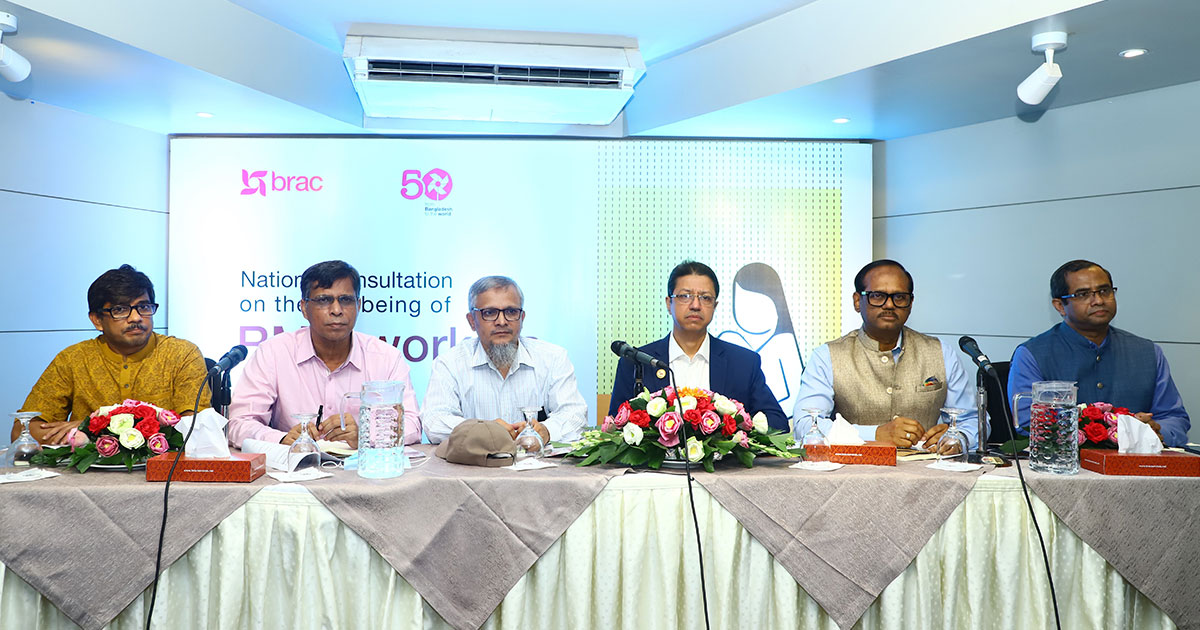
The ‘Made in Bangladesh’ brand in the readymade garments sector is largely the contribution of its millions of workers. A large market of other commodities and services has grown in the country to cater to the demands of the RMG workers. But the country has yet to develop a robust system to ensure the much-needed welfare of the RMG workers even after four decades since the establishment of the industry in the early 1980s. A large section of these workers work for meagre wages due to lack of skills. Many women leave jobs to take care of their newborns in absence of daycare centres, while many pregnant workers leave jobs due to lack of proper care. The country’s RMG sector will secure more sustaining growth once we can ensure basic services, skills training and opportunities and services for the workers.
Currently, the RMG sector contributes 16% to the GDP of Bangladesh, which constituted 83% of the country’s total export earnings in 2021. Bangladesh, second among the world’s readymade wear exporting countries, engages nearly 4.4 million people, 60% of whom are women. At present, this industry brings over 32 billion dollars every year.
These observations and information were shared at an event titled ‘National consultation on the wellbeing of RMG workers’ organised at the BRAC Centre in the capital today (Thursday, 25 August). BRAC, the one of the world’s largest development organisations, hosted the programme with Bangladesh’s commerce minister and lawmaker Tipu Munshi in chair. Special guests at the event were labour and employment secretary Ehsan-E-Elahi, director-general of Health Economics Unit under the Ministry of Health and Family Welfare Dr Md Enamul Haque, and BGMEA vice president Md Shahidullah Azim. Professor of the Institute of Health Economics at the University of Dhaka Dr Syed Abdul Hamid and Centre for Policy Dialogue research director Dr Khondaker Golam Moazzem were present at the discussion panel. Sk Mojibul Huq, programme manager, BRAC Urban Development Programme, presented BRAC’s one-stop service centre model. The event was moderated by the director of BRAC Urban Development Programme and BRAC and BRAC International Climate Change Programme Dr Md Liakath Ali.
The findings of a survey on the effectiveness of the services rendered by the one-stop service centre model were also presented. BRAC and research organisation Lightcastle Partners conducted the study. Lightcastle Partners director Jahedul Amin presented the findings.
Tipu Munshi, minister, Ministry of Commerce, said, “The government has taken various initiatives to ensure the workers’ salary, quality of life and basic services. The prime minister has been giving her full support in this regard. BRAC has set the example of a quality service. This model will ensure the welfare of workers.”
Md. Ehsan-E-Elahi, secretary, Ministry of Labour and Employment, said, “We have two funds - a central fund which is solely dedicated for RMG workers, another one is Shramajibi Kallyan Foundation. With these two funds, I have been mitigating payments to thousands of workers with one-off payment for healthcare, in case of injuries or death, and also for their children's education. We will consider implementing this model of BRAC if they share it with our ministry.”
Dr Syed Abdul Hamid, professor, Institute of Health Economics, University of Dhaka, said, “BRAC has created a 360 degree-model. However, the government’s action is needed here.”
Dr Khondaker Golam Moazzem, research director, CPD, said, “There were many projects that never saw the light of day. With the help of the government, NGOs can come forward and implement such an initiative.”
Md Shahidullah Azim, vice president, BGMEA, said, “To keep up with the new world, we have increased the use of advanced machinery. As a result, we do not require as much manpower as we did in the past. Thus the number of women in the work force is decreasing.”
Md Liakath Ali, director, Climate Change Programme, BRAC and BRAC International, said, “This initiative of ours was small, it will end this year. By doing the pilot programme, we were able to show that this model works.”
The presentation on the research findings informed the audience that BRAC UDP is implementing a 5-year pilot titled “Empowering the RMG workers living in urban slums of Dhaka” (2017-22). Under this project three one-stop service centres have been established in Tongi, Gazipur and Savar, following an innovative OSCC model of BRAC to give coordinated services to garment factory workers. So far, 60,000 people of low-income families have received services including quality healthcare, legal aid, skills training, daycare service for children, financial inclusion services of deposit pension scheme and micro health insurance, and citizen rights awareness. According to the findings, the ERMG project also helped promote work-friendly environment in these areas through connecting the factory owners and workers.
BRAC's initiates fuel and electricity saving measures
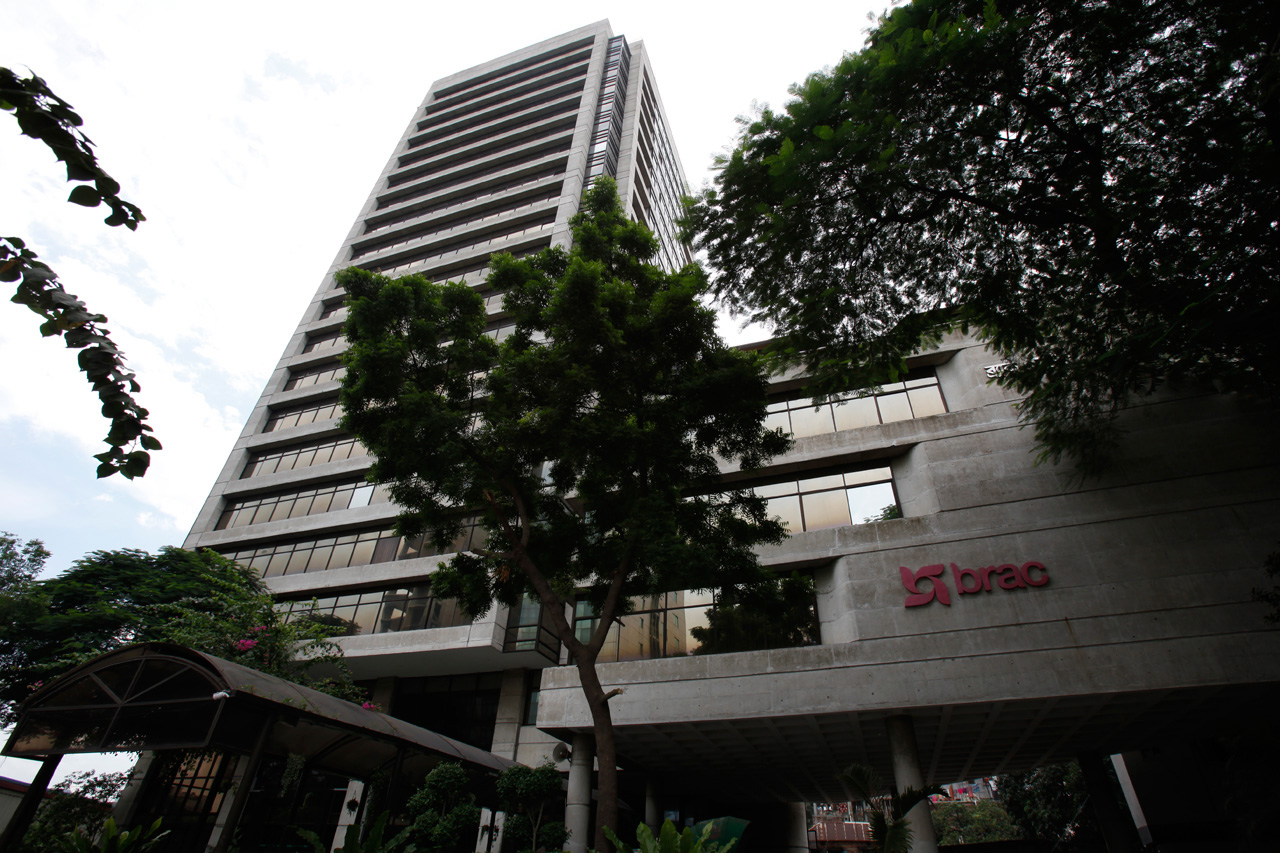
Bangladesh is also among the countries facing a power shortage due to the ongoing fuel crisis in the world. To tackle the situation the government has called on the people to proactively save electricity and fuel. Responding to the call, BRAC has initiated a number of measures to reduce fuel and energy consumption at its head office and offices and settings across the countries. These measures will be effective from 1 August, 2022.
BRAC is doing this by a rigorous reinforcement of its policy measures maximising the use of natural light and air and through following fuel-efficient rules while using BRAC’s vehicles.
BRAC expects the following measures will help save electricity and fuel by at least 25 percent every month:
- BRAC employees will work from home every Tuesday from 1 August, 2022. During that time BRAC head office will remain closed except for urgent tasks.
- Lifts will be operated following an energy saving schedule during office hours. All but one lift will be closed on weekends and holidays.
- Electric lights in the lift lobby and in every floor of BRAC HO where there is sufficient natural light will be turned off. Printers, photocopiers, ovens, kettles and other electronic and electrical appliances will be switched off immediately after use.
- Internet connections will be switched off at BRAC head office from 10pm to 7am every day
- The maintenance team will ensure that electrical lights, fans, and airconditioners of the entire building are switched off by 6pm every day.
- Field visits will be coordinated and combined to minimise use of vehicles and other logistics support in the field
All BRAC field offices and facilities across the country have been instructed to actively save fuel and energy by following similar measures.
BDT 17 crore allocated to stands beside those affected by flood
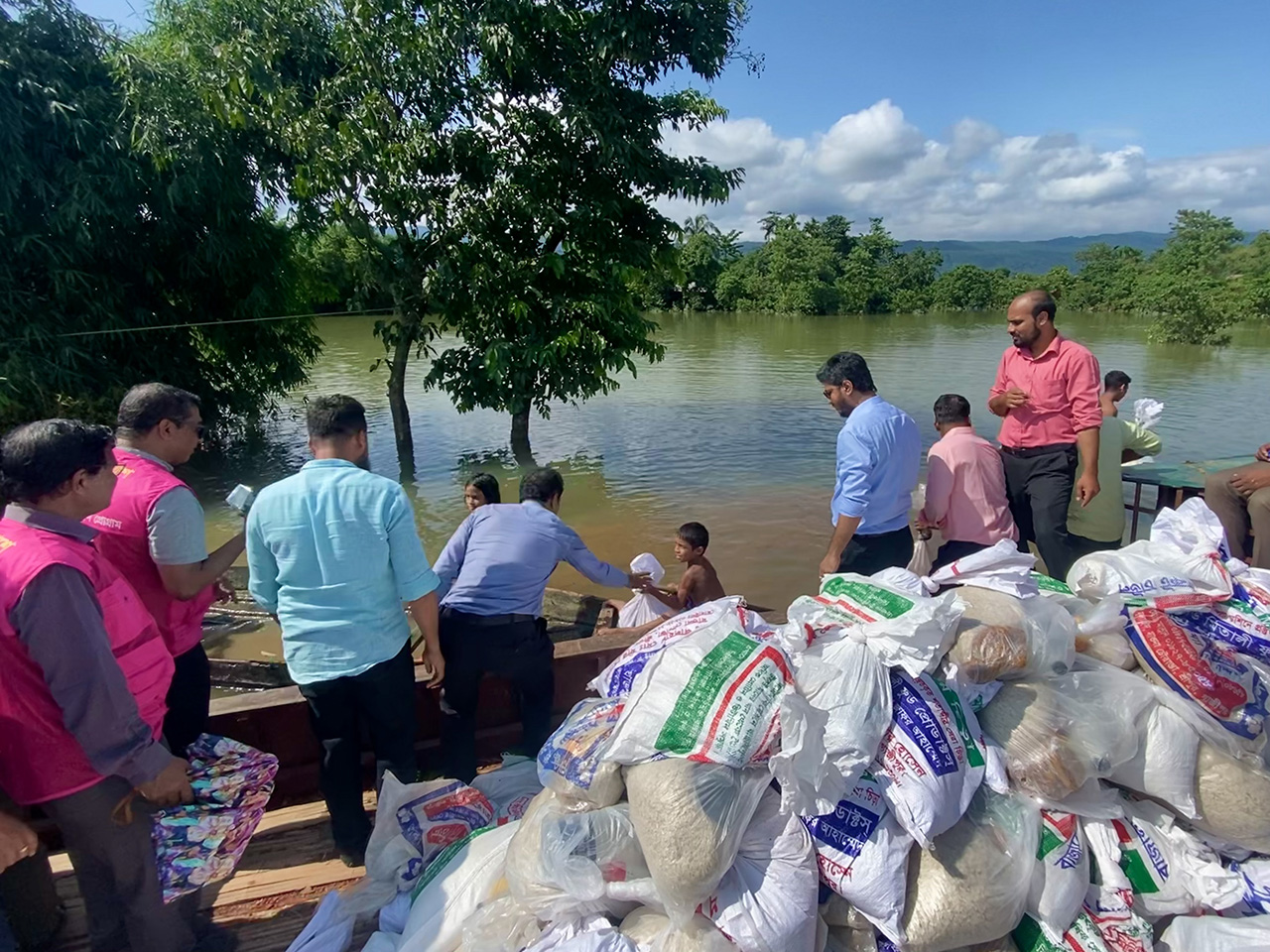
BRAC has been actively engaged with the local administration since the flood situation began deteriorating in the country. The organisation has already distributed emergency flood relief of BDT 3 crore allocated from its own funds to 59,000 families. From next 30 June BRAC will further initiate the distribution of cash assistance of BDT 7.50 crore to another 50,000 flood affected families. Under this initiative, each family will receive BDT 1,500. The relief operations are being carried out in 12 upazilas of Sylhet and Sunamganj, severely affected by the flood.
Animal feed is also being distributed among the affected ultra-poor families in the flood-hit areas. Every family is getting 40kg of animal feed. ACI, a reputed industrial organisation of the country, has come forward in this effort they have sold a total of 203 metric tons of animal feed to BRAC at its production cost. Besides, BRAC Nursery has donated 222 metric tons of silage.
Meanwhile, World Food Program (WFP), has joined BRAC’s relief effort, donating 85 metric tons of high energy biscuits. BRAC's humanitarian staff are delivering these to the flood affected families in remote areas, with each family receiving 50 packets [2.5kg] of biscuits.
As always, priority is being given to the women-led households, and those with elderly, pregnant and lactating women and people with physical and mental disabilities. Even after the floodwaters recede, BRAC will continue supporting the people in the flood-hit areas with necessary healthcare services, housing repairs, and restoring their lives and livelihoods.
BRAC's humanitarian initiative, 'Dakche Amar Desh’, is raising funds for the relief effort. So far, this initiative has been able to raise BDT 17 crore.
In response to BRAC's call, the following organisations have joined its relief effort: World Food Program (WFP), Bill & Melinda Gates Foundation, BRAC Bank, HSBC Bank, BRAC University. Besides these organisations, numerous individuals have joined this initiative with personal donations.
Asif Saleh, executive director of BRAC, has called on all sections of the society to come forward in this effort and stand beside the vulnerable communities in the flood affected areas.
Details of public donations are available on this website: 'Dakche Amar Desh': https://brac.net/dakcheamardesh/. Donations can be sent via this bKash number (merchant number): 01730321765.
Bridge Schools show promising results in the time of pandemic but there is still learning loss in children’s education
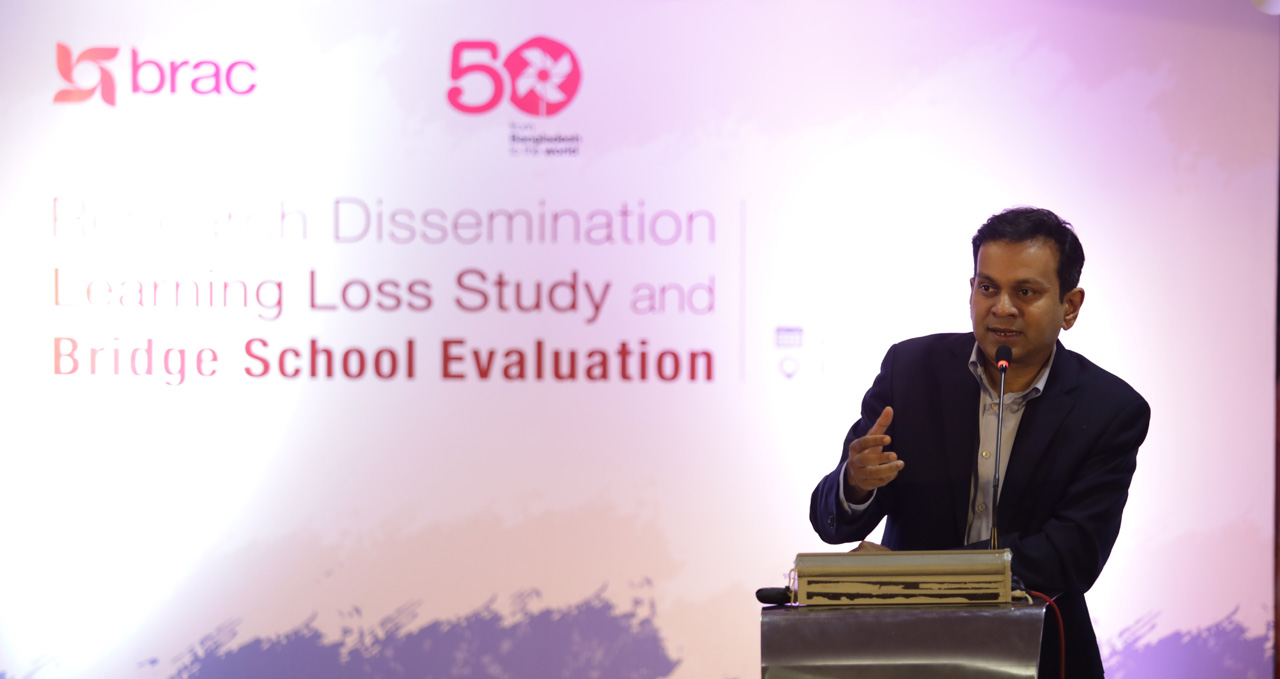
On Thursday, 23 June 2022, BRAC organised a research dissemination event, “Learning Loss Study and Bridge School Evaluation” at BRAC’s head office in Mohakhali. In this event, findings of two studies on BRAC Bridge Schools and learning loss were presented.
BRAC firmly believes that everyone has the right to education. The organisation is moving forward in leaps and bounds to ensure access to primary education for every child. BRAC Education Programme has launched an innovative model called "Bridge School" in 2014. Children from marginalised communities get left behind when it comes to education. With that in mind, the non-formal primary education (NFPE) model was initiated for children who have never been enrolled in any school or have dropped out of primary school at an early stage. Children who have some literacy, knowledge in numeracy and have dropped out of school are included in a bridging course and then they are enrolled in either Class 2 or Class 3 as per their learning qualifications. In the Bridge model, a five-year course of primary education is followed in an intensive method so that children can gather knowledge in a short period of time. In the Bridge model, a four-month bridge course is conducted for Class 2 students. The goal of this course is to overcome students' learning loss and improve their primary knowledge.
A study was conducted to understand how effective this course is. Under BRAC’s supervision, a team of international researchers used Annual Status of Education Report (ASER) tools to evaluate the learning of BRAC Bridge School students. According to their data, it was found that BRAC Bridge School students were ahead in Bangla and Mathematics compared to their Indian counterparts. This assessment was completed in 2021, when Bridge School students – like others from around the world – were at a risk of severe learning loss (due to prolonged school closures since 2020).
Some notable findings of the evaluation of BRAC Bridge Schools include:
- Bridge School students have better skill in reading short stories compared to Indian students (53% relative to 50%)
- Bridge School students are more competent in division math compared to Indian students (63% relative to 28%).
- A significant difference was found when Bridge School students’ short story reading and division math skills were compared to their counterparts from different upazilas/thanas (story reading skill 34% to 85% and division math skill 35% to 89%)
- The performance of urban school students in division math is significantly weaker than those of rural students
The study was led by Stephen Heyneman, emeritus professor at Vanderbilt University, USA; John Richards, professor of public policy at Simon Fraser University, Canada; and Shahidul Islam, a doctoral student at Queen’s University. They all gave a presentation at the event titled, “BRAC Bridge School Evaluation”.
John Richards said, “The Bridge model is targeting children who have dropped out of a government school or have never been enrolled. Most of the children are from low-income families. At present, about 20% of children never finish primary school. One important success of Bridge Schools is that they probably have better reading and math results than the average government schools.”
Stephen Heyneman said, “I have worked in 65 countries and seen many schools. I can say that Bridge Schools were clean, colourful and provided a happy learning space. Children wanted to be there. Learning should be joyful; and these schools had all the materials. We noticed that the teachers all used innovative techniques to connect with parents who used their phones and learned how to monitor their children’s learning. I have not seen that level of control and contact anywhere.”
Shahidul Islam said, “The four-month bridging course that BRAC’s Bridge School model offers to dropout children to put them back on the education track, helps them progress toward graduation that is unique in the world. This model has huge potential for replication in resource-poor settings/countries. It can immensely help in achieving the UN’s Sustainable Development Goal 4 in countries where school dropout is a major challenge.”
Another study was conducted to evaluate the learning loss of children in Bangladesh where Samir Ranjan Nath, programme head of BRAC IED, conducted the ‘Literacy Test’. In this study, Nath found that the enrollment rate in pre-primary schools was 62.7% in 2020, which has come down to 49.6%. Although 96.2% students participated in primary in 2020, it has come down to 93.6% in 2021. Before the COVID-19 pandemic, the rate of female student participation was higher than that of male student participation in pre-primary – which has now declined. After schools reopened, 79.7% students participated of whom 78.6% were in primary and 80.6% were in secondary schools. The attendance rate was found higher for girls than for boys. In rural areas it was 80.9% but in urban areas it was 77.5%.
Samir Ranjan Nath presented his findings on learning loss at the event. He added, “Learning loss is a reality. The question is how fast can we recover from it. This can start with assessment of learning levels of all students, categorise them and prepare recovery strategies as per students’ needs. Parents, peers, retired teachers and temporary teachers can be utilised -- keeping the regular teachers at the centre. Follow-up assessments of students can help understand the progress and take necessary actions.”
Prof Md Farhadul Islam, Chairman, National Curriculum and Textbook Board (NCTB) was a special guest at the event. He said, “We who work in the education sector - we believe in working collectively. Research is very important to evaluate the situation of our education. We will request BRAC to share their findings so that we can use their learning and gather information from them. We will go forward collectively. We are working on a plan to reduce learning loss. In this case, collaboration is necessary.”
Md Nuruzzaman Sharif, Director (Joint Secretary), Bureau of Non-Formal Education (BNFE), Ministry of Primary and Mass Education, was also present at the event. He commented, “The findings are very important for all of us who are working in the education sector. With the recommendations of the two presentations, we will work together with BRAC and others, and learn from their suggestions; and with that we will complete our two running projects.”
Mr Md Muhibur Rahman, Additional Secretary (School) at the Ministry of Primary and Mass Education was present at the event as the chief guest. He said, “The Bridge School Evaluation presentation was done on a BRAC school programme. I don’t have much to comment on it. Our education system is suffering from multifaceted problems. I will put emphasis on the recent problems: school closures and learning loss. It is still too early to comprehensively evaluate these, we are at an early stage. But I believe we can find a solution together if we all work collectively and share our learnings to go forward.”
Asif Saleh, Executive Director of BRAC Bangladesh, was the chair at the event. He said in his closing note, "The impact on learning caused by the school closure during the pandemic is profound. We need to collectively work together to recover the loss of learning and get the education of both children who have dropped out and children who may potentially drop out back on track, especially girls, children with disabilities, and children from ethnic communities. The learnings from our proven Bridge School model along with the findings of BRAC IED's learning loss study will benefit policymakers and practitioners on ways to accelerate learning and build our education systems back better."
Join the world’s biggest family

